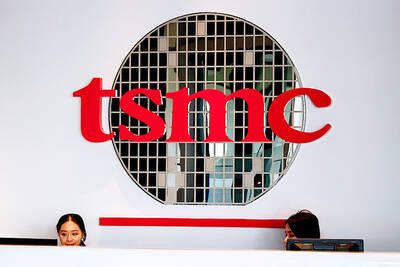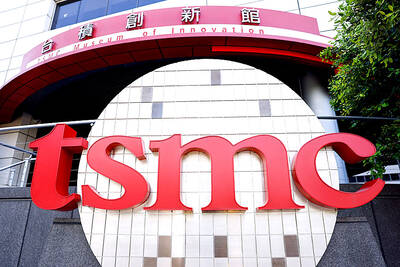Powerchip Technology Corp (力晶科技) and its investment subsidiary yesterday said they would sell all of their shares in Rexchip Electronics Corp (瑞晶電子) to Micron Technology Inc of the US, as consolidation continues to sweep the global DRAM industry.
Hsinchu-based memorychip maker Powerchip and Taipei-based Li Hsin Investment Corp (力信投資) said in separate stock exchange filings that they would sell a total of 691.13 million shares in Rexchip to Micron for NT$9.696 billion (US$324.2 million) at NT$14.03 per share.
Rexchip is a PC memory chip manufacturing venture between Powerchip and Japan’s Elpida Memory Inc, the third-largest DRAM chipmaker in the world.
The deal would be conditional on Micron’s purchase of the remaining shares of Rexchip from Elpida, a public relations officer at Powerchip said by telephone yesterday.
The share sale, announced before the opening of the local stock market yesterday, lifted Powerchip’s stock yesterday. Shares of the memorychip maker jumped 5.45 percent to NT$0.58 per share on the over-the-counter market, outperforming the GRETAI Securities Market index’s 0.95 percent rise.
Shares of Rexchip also surged 12.36 percent to NT$10 on the Emerging Stock Market, a preparatory board for Taiwan’s two main bourses.
Micron confirmed in a statement later yesterday that it had agreed to acquire the Powerchip Group’s 24 percent stake in Rexchip.
The US company also said in the statement it had reached an agreement with Elpida’s trustees to acquire Elpida for about ¥200 billion (US$2.5 billion). Under the agreement, Micron said it would acquire 100 percent of the equity of Elpida for ¥60 billion and ¥140 billion in future annual installment payments through 2019 would be paid from cash flow generated from Micron's payment for foundry services provided by Elpida, as a Micron subsidiary.
"We are creating the industry-leading pure-play memory company," Micron chief executive officer Mark Durcan said in the statement.
Yukio Sakamoto, Elpida president and chief executive officer as well as the company's co-trustee, said joining with Micron would result in a combined organization that can best serve customers with broader memory solutions, strength and scale.
The Micron-Elpida deal is expected to close in the first half of next year, while Micron's purchase of Powerchip Group's Rexchip shares will occur upon the completion of the Elpida deal, according to the statement.
Micron’s acquisition of Elpida would boost the US company’s market share to nearly 24 percent, allowing it to overtake Hynix Semiconductor Inc, with a market share of 23.9 percent, and make it the world’s second-largest DRAM chipmaker after Samsung Electronics Co of South Korea, DRAMexchange, a research division of Taipei-based TrendForce Corp (集邦科技), said in a report on Sunday.
The report said Micron’s acquisition of Elpida was likely to produce a multinational team of memorychip makers integrating capacity. This Micron-led alliance would be able to combine the strengths of various manufacturers in Taiwan and Japan to compete with South Korean firms, it said.
“Micron will concentrate its efforts on server DRAM and NAND flash products, with the majority of production taking place at the US maker’s Singapore fab,” the report said. “Elpida will focus on mobile DRAM production, already evident in the increase of mobile DRAM capacity to 70 percent at its Hiroshima fab.”
While Rexchip may continue focusing solely on commodity DRAM production, Micron may consider Rexchip’s R2 fab, which is idle at the moment, for NAND flash production in anticipation of strong market demand, DRAMexchange said.
As for Winbond Electronics Corp (華邦電子), another Taiwanese memorychip maker, Micron might consider increasing its server DRAM output ratio to more than 50 percent as the cloud-computing market expands, while Powerchip might gain authorization to use Micron’s 20 nanometer process technology for commodity DRAM production, according to DRAMexchange.
With a total monthly capacity representing 35 percent of global DRAM capacity, “the Micron team will be on a level playing field with Samsung and Hynix, joining the [South] Korean makers as the third heavyweight in the DRAM industry,” the report said.
This story has been updated since it was first published.

Chizuko Kimura has become the first female sushi chef in the world to win a Michelin star, fulfilling a promise she made to her dying husband to continue his legacy. The 54-year-old Japanese chef regained the Michelin star her late husband, Shunei Kimura, won three years ago for their Sushi Shunei restaurant in Paris. For Shunei Kimura, the star was a dream come true. However, the joy was short-lived. He died from cancer just three months later in June 2022. He was 65. The following year, the restaurant in the heart of Montmartre lost its star rating. Chizuko Kimura insisted that the new star is still down

While China’s leaders use their economic and political might to fight US President Donald Trump’s trade war “to the end,” its army of social media soldiers are embarking on a more humorous campaign online. Trump’s tariff blitz has seen Washington and Beijing impose eye-watering duties on imports from the other, fanning a standoff between the economic superpowers that has sparked global recession fears and sent markets into a tailspin. Trump says his policy is a response to years of being “ripped off” by other countries and aims to bring manufacturing to the US, forcing companies to employ US workers. However, China’s online warriors

Taiwan Semiconductor Manufacturing Co (TSMC, 台積電) listed the challenges of ensuring export control compliance by its customers, months after the company’s artificial intelligence (AI) silicon was found to have flowed to US-sanctioned Huawei Technologies Co (華為) via intermediaries. “TSMC’s role in the semiconductor supply chain inherently limits its visibility and information available to it regarding the downstream use or user of final products that incorporate semiconductors manufactured by it,” the Hsinchu-based company said in its latest annual report released on Friday. The world’s largest contract chipmaker said the constraint impedes its ability to prevent unintended end-uses of its semiconductors, as well

Taiwan Semiconductor Manufacturing Co (TSMC, 台積電) expects steady growth this year despite global economic uncertainty due to continued momentum from tech trends such as 5G, artificial intelligence (AI) and high-performance computing (HPC) applications. In the company’s annual shareholders’ report released on Thursday, TSMC chairman and CEO C.C. Wei (魏哲家) said the company is well-positioned to meet market demand with its differentiated technology platforms. The company’s 2-nanometer process is on track for volume production in the second half of this year, while its next-generation nanosheet-based A16 process, aimed at HPC applications, is scheduled for mass production late next year, Wei said. Advanced technologies —